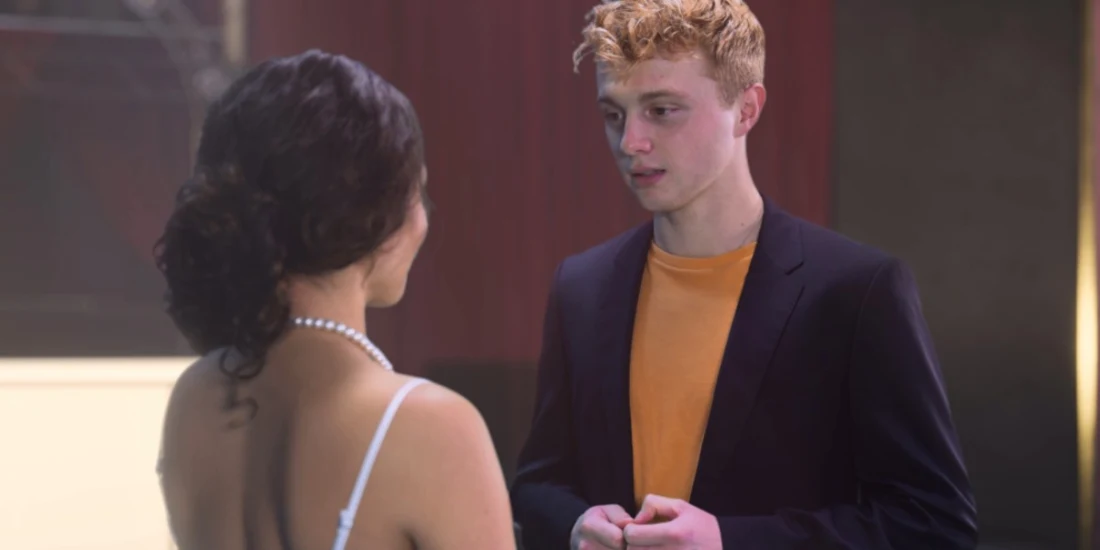A disconnected 'Romeo and Juliet' struggles to overcome isolation constraints
This gets an A for effort, I suppose. It can't be easy during the pandemic working on Shakespeare given the size and scope of his plays, both of which run counter to the demands of social distancing and other dictates of our infectious times. All credit, therefore, to Metcalfe Gordon Productions for even daring to mount a new Romeo and Juliet available for streaming in this climate: a project put together in two weeks that by necessity required the cast to film their parts individually so as to be synced up later in the editing suite. (Co-producer Ryan Metcalfe was the venture's commendably industrious editor.)
In casting terms, primary interest lies in the shift from musical theatre to Shakespeare of the fast-rising 22-year-old Sam Tutty, an Olivier Award winner this past autumn for his West End debut in Dear Evan Hansen. And so we have the first of an unexpected spate of disparate versions of this play, which include the Queen's Theatre in Hornchurch, Essex, who are planning a production via Zoom later this month entitled Sharon 'N' Barry Do 'Romeo and Juliet' and, very excitingly, a filmed version of a production originally intended last year for the National Theatre's Olivier stage that will instead come to Sky Arts and PBS in the UK and US during April. That one stars Josh O'Connor, from The Crown, and Fargo's Jessie Buckley in the title roles.
Where, then, does this convergence of interest on a single title leave director Nick Evans's current approach? Rather high and dry, I'm sad to report, notwithstanding the laudable efforts of all involved. "Only connect," the novelist E.M. Forster famously wrote in a different context, and this hybrid of theatre and film makes the importance of that dictum doubly clear. It would seem on current evidence that actors really do need one another present to spark off of and to develop some sort of rapport. Isolation, no matter how ingeniously managed, doesn't cut it.
The filmmakers write in the online programme of "trying to find a new language": each actor was shot from three cameras in order to allow for maximum possibilities during the edit later on. But no amount of stitching actors together after the fact can compensate for a sense of immediacy and, well, connection that was disallowed by the very nature of this project. The cumulative effect is of a lot of well-meaning performers acting into a digital void or, perhaps, delivering audition speeches for some sort of drama school panel that exists just out of view.
The welcome exception to the overall weightlessness is Tutty, who shows the same natural instinct for classical verse that he has brought to his newfound status as a West End leading man. The actor's open-faced quizzicality - a quality useful for Evan Hansen - serves him well for Romeo, rescuing the part from narcissistic self-poeticizing and granting Tutty a textual authority that too many of the younger members of the cast lack. (Some of the men are woefully underpowered.) Of use, as well, is the fact that Tutty and his Juliet, recent drama school graduate Emily Redpath, were actually able to perform together for a brief COVID-secure commingling and so are allowed that rather basic gift of actors responding to one another in the moment that is absent elsewhere: Redpath, for her part, deftly projects adolescence stiffening into a grievous early adulthood as events progress.
The setting is the inevitably dystopian (is there any other kind?) near-future, where mobile phones and masks are readily in evidence and Brandon Bassir's nimble Mercutio and his often bare-chested chums look as if they are ready for a night of clubbing in Vauxhall. (Spandau Ballet gets pressed into service on the soundtrack.) Jonny Labey has his moments as an apparently metrosexual Paris and a fluty-sounding Derek Jacobi, of all people, appears at the start to deliver the play's portentous prologue well before Sam Dinley's music takes over to amplify the gathering dread.
But there's no escaping the ugly visuals that often catch the actors in a ghostly light as the interiors shift between an empty Palace Theatre, Manchester - a deliberate reminder of our sorrowful theatrical reality - and the various locations of the East London studios where the play, which has been judiciously trimmed, was mostly filmed. The acting tends towards earnest gesticulation on the one hand and stern moments of admonition on the other. But all the technological sleight-of-hand can't provide the dynamic that comes from actors sharing a stage (or set). The production goes boldly forward conceptually only to feel as if it is running in place.
Photo credit: Emily Redpath and Sam Tutty in 'Romeo and Juliet' (Photo by Ryan Metcalfe)
Originally published on
